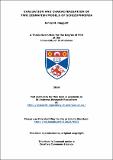Files in this item
Evaluation and characterisation of two zebrafish models of schizophrenia
Item metadata
| dc.contributor.advisor | Brown, Verity Joy | |
| dc.contributor.author | Daggett, J. M. (Jenny Michelle) | |
| dc.coverage.spatial | x, 129 p. | en_US |
| dc.date.accessioned | 2016-10-04T11:16:37Z | |
| dc.date.available | 2016-10-04T11:16:37Z | |
| dc.date.issued | 2016-11-30 | |
| dc.identifier | uk.bl.ethos.694560 | |
| dc.identifier.uri | https://hdl.handle.net/10023/9603 | |
| dc.description.abstract | Cognitive deficits are the single strongest predictor of the functional outcome in patients with schizophrenia. Current treatments are largely ineffective in improving cognitive impairments and promising pre-clinical research has mostly failed to translate clinically. Despite the advances provided by rodent models, the neurobiological basis of cognitive deficits in schizophrenia is poorly understood. Therefore, this thesis proposes a zebrafish model for studying cognitive impairments of schizophrenia. Although more evolutionarily distant to humans compared to the rat, the zebrafish has emerged as a popular vertebrate model of human disorders due to its genetic tractability, complex nervous system and elaborate behavioural repertoire. We investigated the effects of genetic alterations and neurodevelopmental disruption on behaviour and learning in zebrafish. Using both disc1 mutant lines and sub-chronic phencyclidine (PCP) on larvae from 6-10 dpf, we were able to assess behavioural changes as a function of developmental age. In particular, this thesis aimed to develop appropriate behavioural assays to assess zebrafish learning and executive function relevant to disorders seen in human patients with schizophrenia. It was possible to demonstrate robust learning across several domains, namely, reversal, classical avoidance and non-associative learning, alongside locomotor and anxiety-related behaviours. There were varied deficits associated with each of the two – genetic (disc1 gene mutation) and environmental (sub-chronic PCP) – manipulations, consistent with observations in rat research. Together, the research in this thesis demonstrates that a zebrafish model exhibits behaviour resembling that of mammalian models of schizophrenia and provides a foundation for the utility of zebrafish in examining cognitive impairments associated with schizophrenia. | en_US |
| dc.language.iso | en | en_US |
| dc.publisher | University of St Andrews | |
| dc.rights | Attribution-NonCommercial-NoDerivatives 4.0 International | * |
| dc.rights.uri | http://creativecommons.org/licenses/by-nc-nd/4.0/ | * |
| dc.subject | Zebrafish | en_US |
| dc.subject | Schizophrenia | en_US |
| dc.subject | Cognitive flexibility | en_US |
| dc.subject | Phencyclidine | en_US |
| dc.subject | Habituation | en_US |
| dc.subject | Set shifting | en_US |
| dc.subject | Motivation | en_US |
| dc.subject | NMDA receptors | en_US |
| dc.subject.lcc | RC514.D2 | |
| dc.subject.lcsh | Schizophrenia--Animal models | en_US |
| dc.subject.lcsh | Zebra danios as laboratory animals | en_US |
| dc.title | Evaluation and characterisation of two zebrafish models of schizophrenia | en_US |
| dc.type | Thesis | en_US |
| dc.type.qualificationlevel | Doctoral | en_US |
| dc.type.qualificationname | PhD Doctor of Philosophy | en_US |
| dc.publisher.institution | The University of St Andrews | en_US |
The following licence files are associated with this item:
This item appears in the following Collection(s)
Except where otherwise noted within the work, this item's licence for re-use is described as Attribution-NonCommercial-NoDerivatives 4.0 International
Items in the St Andrews Research Repository are protected by copyright, with all rights reserved, unless otherwise indicated.


